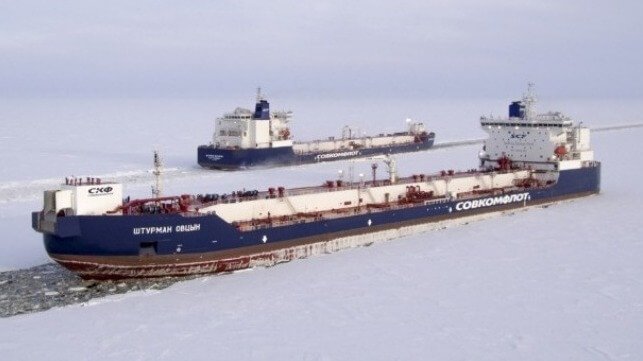Russia Details NSR Growth with Year-Round Service to Begin in 2024

Russia released the transcript of a meeting conducted by President Vladimir Putin in which they highlighted the rapid development of the Northern Sea Route, which Putin called “extremely important for us.” The minister overseeing the region as well as the director general of Russia’s atomic energy company Rosatom highlighted the growth and concluded the presentation by reporting they were ready to launch year-round operations early in 2024 on the eastern portion of the route.
Putin has been driving the development of the shipping route setting goals for the companies and ministries as part of the growth plans for the energy and minerals exports from Russia. Minister Alexei Chekunkov highlighted to Putin that as per his instructions, a plan was in place for the NSR through 2035. He said volumes have already grown from 4 million tonnes in 2014 to 34 million tonnes in 2022, “surpassing the Soviet record five-fold.”
“We must think about the future,” Putin told the audience. “The Northern Sea Route is opening up.”
The head of Rosatom, Alexei Likhachev, highlighted the continuing progress concluding by saying, “Mr. President, I would like to inform you that together with NOVATEK we are set to launch year-round navigation in the eastern part of the Northern Sea Route early next year. This is a truly historic decision, which is crucial for the development of the entire Arctic region and particularly important for our country’s economy.”
Preparing for the launch of year-round service they reported on the start of the coastal service from Murmansk and Kamchatka in 2022. They said it is growing from four to now 11 ports and has been extended to Vladivostok.
Rosatom said the target is to reach 36 million tonnes of cargo transported along the NSR up from 34 million tonnes in 2022, which was 1 million tonnes ahead of 2021, but 2 million tonnes ahead of plan. He said the efforts were designed to support the subsoil (miners) and energy companies while during the presentation it was highlighted that the route was critical for the export of oil, LNG, mineral fertilizers, and metals, among other commodities. Chekunkov said the ultimate goal under the master plan is to support 100 million tonnes by 2026 and 200 million tonnes by 2030.
They announced that the leading Arctic companies – NOVATEK, Vostok Oil, Gazprom Neft, Nornickel, Baimskaya, and Severnaya Zvezda – have signed commitments on cargo volumes. Under the agreements, these companies will ship at least 30 million tonnes of cargo this year through the NSR, no less than 71 million tonnes in 2024, and over 190 million tonnes in 2030.
Citing the government’s support, Chekunkov also outlined five initiatives including developing a cargo base, building fourteen ports and terminals stretching from Murmansk to Vladivostok, fleet expansion, a new satellite network, and centralizing navigation control at Rosatom. Near real-time ice monitoring they said would be possible in the next two years as the government invests 1.8 trillion rubles ($22.5 billion) into the NSR.

that matters most
Get the latest maritime news delivered to your inbox daily.
Vessels will be one key area where Russia must continue to invest. They said in total as many as 153 vessels are required. They cited plans to proceed with two additional nuclear-powered icebreakers as well as a decision this year on starting four conventionally-powered icebreakers. At present Rosatom said 30 ships are operating and 33 are under construction. Between 2023 to 2025 they also said that 16 new emergency rescue vessels would be put into service on the route while noting that there were no emergency icebreaking requirements in 2022.
While saying that the sanctions imposed by the West, including restrictions on equipment, had not slowed the work, they said the shipbuilding industry was challenged by “replacing a number of technologies originating in unfriendly countries.” They said they were working to overcome the challenges while saying none of the major projects in the Arctic had been suspended in 2022.
